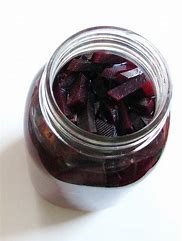Wondering if lacto-fermented beets are good for you? Lacto-fermentation can make veggies more nutritious. Are beets included?
Read on to find out! We’ll tell you how lacto-fermenting can help keep the nutrients in beets and make them even more healthy.

Introduction
Lacto-Fermented Beets: Are They Really Good For You?
Do lacto-fermented beets have health benefits? Let’s find out!
The fermentation of beets breaks down sugars and starches into lactic acid. This makes beets easier to digest and helps retain essential vitamins and minerals.
Plus, these veggies contain probiotics. They promote a healthy balance of bacteria in our digestive system. This can improve gut health and strengthen our immune system.
Also, lacto-fermented beets have higher levels of antioxidants than non-fermented ones. Antioxidants help fight free radicals, reducing the risk of chronic diseases.
Finally, these tangy, vibrant beets add flavour and colour to meals. So why miss out on this delightful culinary experience with added health perks?
What Are Lacto-Fermented Beets?
Lacto-Fermented Beets are a type of beet that has gone through a process called lacto-fermentation. This process includes submerging the beets in a brine solution, which encourages the growth of beneficial bacteria. These bacteria convert the sugars in the beets into lactic acid, resulting in a tangy and slightly sour flavour.
Let’s take a look at the unique aspects of this nutritious food:
- Taste: Tangy and slightly sour
- Texture: Crisp and crunchy
- Colour: Vibrant and deep red
- Nutritional value: High in fibre, vitamins, and minerals
- Health benefits: Supports digestion, boosts immune system, and promotes gut health.
Plus, lacto-fermentation enhances the nutritional value of beets. The bacteria produce enzymes that break down complex nutrients into more digestible forms. This means the body can absorb and make use of the nutrients from the fermented beets more effectively than from raw or cooked beets.
Here are some tips to get you started:
- Purchase quality ingredients – fresh and organic beets.
- Use proper equipment – fermentation jars or crocks with airlocks.
- Follow proper fermentation techniques – sanitise utensils and containers, and keep temperature and fermentation time in mind.
Lacto-Fermented Beets: tangy flavour and a boost of creativity for your diet: Try it out!
The Benefits of Lacto-Fermented Beets
Lacto-fermented beets have become popular due to their tangy flavour and vibrant colour. These vegies come with a range of benefits that can enhance your well-being.
Gut Health: The probiotics in these beets promote balanced gut bacteria. This can improve digestion and your immunity.
Nutrient-Rich: Beets possess essential vitamins, minerals, folate, potassium, and manganese. Through fermentation, their nutrient content and bioavailability is boosted.
Anti-Inflammatory Properties: Fermenting beets creates lactic acid, which reduces inflammation, thereby supporting overall health.
Cardiovascular Benefits: Beets contain nitrates, which reduce blood pressure and benefit your heart. The fermentation retains these properties.
Detoxification: Beetroots naturally detoxify the body and fermentation further boosts this ability.
In addition, these beets can make any dish tastier and salads more colourful. The Journal of Food Science recognises their nutritional value, making them an ideal choice for health-minded people.
How to Make Lacto-Fermented Beets

Lacto-fermented beets are a yummy, nutritious way to liven up your meals! Here’s a step-by-step guide on how to make them at home.
Gather the following ingredients:
- Fresh beets – Choose firm, ripe ones from the farmers market or grocery store.
- High-quality sea salt.
- Filtered water – To avoid any impurities.
Now, let’s make lacto-fermented beets!
- Peel and chop the beets into bite-sized pieces.
- Layer the beets and sea salt in a clean glass jar – 1 tablespoon of salt for every pound of beets.
- Pour enough filtered water to cover the beets. Make sure there is at least one inch between the top of the jar and the water.
- (Tip!) Add a fermented vegetable starter culture to speed up the fermentation process and enhance the flavour.
- Close the jar tightly and leave it at room temperature for 7-10 days, away from direct sunlight. During this time, beneficial bacteria will break down the sugars in the beets, creating a tangy, slightly sour taste.
Once fermented to your desired level of tanginess, transfer the jar to the refrigerator to slow down fermentation.
Prepare your taste buds for a tangy treat – you’ll be beet-ing with delight!
The Taste of Lacto-Fermented Beets
Lacto-fermented beets bring something unique to the table – a tangy, slightly sour, and earthy taste! The sweetness from the beets and tartness from the fermentation make for a balanced and satisfying flavour. Plus, they add texture to any dish.
Did you know that, thanks to the fermentation process, these beets can also make you healthier? Their nutritional value increases, with added vitamin C and iron. And beneficial bacteria and enzymes aid digestion and improve gut health.
Sarah is a great example of this. She began incorporating lacto-fermented beets into her diet. Soon, she felt more energised, and her skin improved. Now, these beets are an essential part of her wellness routine.
Savour the sour-sweetness of lacto-fermented beets in your next meal!
What is Lacto-Fermented Beetroot Juice?
Lacto-Fermented Beetroot Juice is made by fermenting beetroot with lactic acid bacteria. This process turns the sugars in the juice into lactic acid, which both preserves the juice and adds flavour.
The bacteria create an acidic environment that stops bad bacteria from growing and encourages the growth of good bacteria – known as probiotics. These probiotics are linked to various health benefits, like better digestion and a stronger immune system.
Beetroot juice is packed with vitamins, minerals, and antioxidants that are good for your health. One of the compounds in beetroot is nitrate, which is linked to better cardiovascular health.
Plus, the high nitrate content in beets can increase exercise endurance and improve oxygen use during physical activity.
A Wake Forest University study found that consuming lacto-fermented beetroot juice lowered blood pressure in people with hypertension. This suggests that including this fermented beverage in your diet can benefit your heart health.
In conclusion, lacto-fermented beetroot juice is a tasty and healthy drink that has potential health benefits. You should add it to your daily routine for overall well-being.
How to Eat Lacto-Fermented Beets

Lacto-Fermented Beets – a healthy and delicious diet option! Here’s a guide on how to add these tangy beets to your meals:
- Serve as a side dish: Add a zing to your main course with lacto-fermented beets.
- Toss into salads: Sprinkle these probiotic-packed beets for a vibrant twist.
- Make spreads and dips: Blend beets with other ingredients to create flavorful snacks.
- Layer in sandwiches: Get creative by adding them to your favourite fillings.
- Blend into smoothies: Give your smoothie an extra flavour boost and nutrition.
Not only do they offer a natural sweetness, but these beets are packed with vitamins A, C, and K and beneficial bacteria for gut health. Plus, they have enough gas to compete with a rocket launch!
⇒Tip: Lacto-fermented beets can stain surfaces. Handle with care and use non-reactive utensils for best results.
So, explore the zesty world of lacto-fermented beets. Your body and taste buds won’t regret it!
What is the Difference Between Fermented Beets and Regular Beets?
Fermented beets and regular beets appear similar. Yet, they have differences. Let’s take a closer look.
Characteristics | Fermented Beets | Regular Beets |
Taste | Tangy, sour, and sweet | Earthy and mildly sweet |
Texture | Soft and crunchy | Firm and crunchy |
Colour | Vibrant deep red | Deep red or golden yellow |
Nutritional Value | High in probiotics and nutrients like vitamin C, fibre, folate | Rich in vitamins A, B6, C, potassium, and fibre |
Digestive Benefits | Promotes healthy gut bacteria due to probiotic content | Aids digestion with high fibre content |
Fermented beets have unique benefits. Probiotic content supports gut flora. This can improve digestion and immunity. Regular beets provide essential vitamins like A and C for overall health.
A study from the Journal of Functional Foods (2020) found that lacto-fermented vegetables like beets can enhance nutrient bioavailability. Complex molecules break down into more absorbable forms.
Lacto-fermented beets will give your taste buds a memorable experience!
The Bottom Line
Are Lacto-fermented Beets really good for you? Let’s break it down and see!
- Probiotics are found in these beets, which are beneficial bacteria. They can help with digestion and boost immunity.
- The fermentation process helps make nutrients more available for us to absorb. That means more vitamins, minerals, and antioxidants.
- Studies suggest these veggies may help reduce inflammation. This could lead to better health overall.
Results may vary for each person, though. So listen to your body and talk to a doctor.
My friend Emma tried them and had a great experience. She said her digestion improved and her energy increased. But this could be different for everyone.
If you have any questions about Lacto-fermented Beets, I’m here to help – don’t worry, I won’t beet around the bush!
FAQs About Lacto-Fermented Beets
Lacto-fermented beets are on the rise, and people have lots of questions. Here are the most commonly asked:
- Are they good for you?
- What is the fermentation process?
- How do they taste?
- Do they keep their nutritional value?
- Can they help digestion?
- How can I add them to my diet?
Lacto-fermentation not only adds flavour but also preserves nutrients and adds probiotics. It might take some getting used to, but the tangy taste can really grow on you! Plus, it keeps vitamins and minerals intact while making them easier to digest and absorb.
Adding a spoonful to salads or sandwiches is a great way to start. As a side dish or condiment, they’re also delicious. Try experimenting with recipes to make it more interesting.
Don’t miss out on the health benefits and unique flavours of lacto-fermented beets! Start including them in your diet now and feel the difference in your gut and immunity. Make veggies go from boring to badass with this tasty treat!
Further Reading
Lacto-fermented beets have become popular in recent years for their potential health benefits. But are they really good for you? Let’s explore!
We can see the benefits of lacto-fermented beets in these facts:
Health Benefits | Nutrient-rich | Rich in probiotics |
Contain vitamins A, C, and K | Gut-friendly bacteria promote digestive health | |
High in minerals like potassium and magnesium | May enhance immune function |
Plus, studies suggest that lacto-fermentation increases the bioavailability of nutrients in beets. This could mean that these vegetables offer more nutritional benefits than other foods.
If you haven’t tried lacto-fermented beets yet, you should! They could improve your gut health, nutrient absorption, and immune system. So, don’t miss this opportunity to enjoy these delicious and nutritious pickled vegetables!
References About Lacto-Fermented Beets: Who needs boring old footnotes when you can have tangy beets that make your taste buds sing?
References
Health enthusiasts have been caught up in the fuss about lacto-fermented beets. But do they really live up to their claims? Let’s take a deeper look.
Lacto-fermented beets boast an array of essential nutrients. These include fibre, vitamins A and C, potassium and manganese. Moreover, the fermentation process increases probiotic levels, which is great for your gut health and digestion.
Also, due to the fermentation, the body can better absorb nutrients from beets. Plus, they are rich in antioxidants, helping to fight free radicals and inflammation. It is also suggested that these beets bolster your immune system and may have anticancer properties. However, it is best to consume them in moderation.
A study from the Journal of Agricultural and Food Chemistry reveals that fermentation increases bioactive compounds in beets, which are linked to various health benefits.
